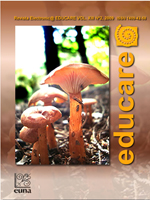Recursos didácticos digitales: medios innovadores para el trabajo colaborativo en línea
DOI:
https://doi.org/10.15359/ree.13-2.4Keywords:
digital didactic resources, information and communication technologies, e-learningAbstract
The purpose of this paper is to present the origin, characteristics and rules of the Blogs, Wikis, Chats, Forums, and the Cmap Tools, that one must take into account when working with them as digital resources. In addition, the main contribution offered, is an explanation of possible didactic uses that these resources offer as a dynamic strategic proposal for collaborative e-learning.
References
Ausubel, D., J. D. Novak., y Hanesian, H. (1986). Psicología educativa: un punto de vista
cognoscitivo. (2ª ed.). México, D.F.: Trillas.
Basterrechea, J. (2007). Integración de los recursos didácticos digitales en la enseñanza del español:
Hacia un nuevo paradigma. Recuperado el 19 de junio de 2007, de http://cvc.cervantes.es/
obref/congresos/rosario/ponencias/internacional/basterrechea_j.htm#Arriba
Conejo, M. (2002) Blogs. Usos didácticos. Recuperado el 25 de julio de 2009, de http://cprmerida.
juntaextremadura.net/
Escamilla, J. (2003 reimp.) Selección y uso de tecnología educativa. (5ª Reimp.) México, D.F.
Trillas.
Gallego, A. (2006). Guías fáciles de las TIC-Blogs. Colegio Oficial de Ingenieros de la
Telecomunicación. Recuperado el 25 de julio de 2009, de http://www.coit.es/pub/ficheros/
blogs_425672d7.pdf
García, A. (2006). Blogs y Wikis en tareas educativas. Recuperado el 25 de julio de 2009, de http://
observatorio.cnice.mec.es/modules.php?op=modload&name=News&file=article&sid=378
Institute For Human and Machine Cognition. (actualizado en enero 2009) CmapTools. Recuperado
el 25 de julio de 2009.
Learning Management System, Moodle. (s.f). Usos didácticos del Wiki. Recuperado el 25 de julio
de 2009, de http://docs.moodle.org/es/Usos_did%C3%A1cticos_del_Wiki
Learning Management System, Moodle. (s.f.). Usos didácticos de los Foros. Recuperado el 25 de
julio de 2009, de http://docs.moodle.org/es/Usos_did%C3%A1cticos_de_los_Foros
Ornelas, D. (10 de noviembre, 2007). El uso del Foro de Discusión Virtual en la enseñanza. Revista
Iberoamericana de Educación, Vol. 44 (4), 12 y 22.
Townsend, R. (2000). El reto tecnológico. Recuperado el 12 de junio de 2007, de http://wzar.unizar.
es/acad/fac/egb/educa/jlbernal/Retec.html
Vargas, E. (1998). Metodología de la enseñanza de las Ciencias Naturales. San José, Costa Rica:
EUNED.
Viñas, F., Villar, E., Caparrós, B., Juan, J, Perez, I., y Cornellá, M. (2002). Internet y Psicopatología:
El uso del CHAT y su relación con diferentes índices de psicopatología. Recuperado el 10 de
agosto de 2009, de http://www.psiquiatria.com/articulos/psiq_general_y_otras_areas/internet/4837/
Downloads
Additional Files
Published
How to Cite
Issue
Section
License
1. In case the submitted paper is accepted for publication, the author(s) FREELY, COSTLESS, EXCLUSIVELY AND FOR AN INDEFINITE TERM transfer copyrights and patrimonial rights to Universidad Nacional (UNA, Costa Rica). For more details check the Originality Statement and Copyright Transfer Agreement
2. REUTILIZATION RIGHTS: UNA authorizes authors to use, for any purpose (among them selfarchiving or autoarchiving) and to publish in the Internet in any electronic site, the paper´'s final version, both approved and published (post print), as long as it is done with a non commercial purpose, does not generate derivates without previous consentment and recognizes both publisher's name and authorship.
3. The submission and possible publication of the paper in the Educare Electronic Journal is ruled by the Journal’s editorial policies, the institutional rules of Universidad Nacional and the laws of the Republic of Costa Rica. Additionally, any possible difference of opinion or future dispute shall be settled in accordance with the mechanisms of Alternative Dispute Resolution and the Costa Rican Jurisdiction.
4. In all cases, it is understood that the opinions issued are those of the authors and do not necessarily reflect the position and opinion of Educare, CIDE or Universidad Nacional, Costa Rica. It is also understood that, in the exercise of academic freedom, the authors have carried out a rogorous scientific-academic process of research, reflection and argumentation thar lays within the thematic scope of interest of the Journal.
5. The papers published by Educare Electronic Journal use a Creative Commons License:














 The articles published by Educare Electronic Journal can be shared with a Creative Commons License:
The articles published by Educare Electronic Journal can be shared with a Creative Commons License: 



